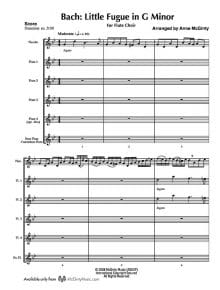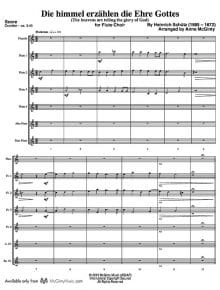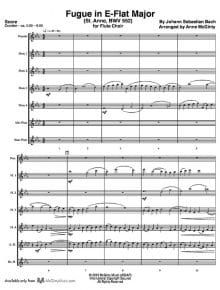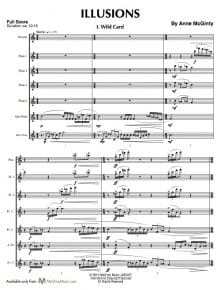Search Music
Music Categories
PDF Download Only
Purchase. Print. Play.
-
Bach: Little Fugue in G Minor – Flute Choir
The well known Little Fugue in G Minor is now scored for the full flute orchestra: Piccolo, four C Flutes, Alto Flute in an appropriate range and adding depth to Flute 4, with Bass Flute and Contrabass Flute on the original organ peddle. A welcome addition to the flute choir repertoire!
Composer: Anne McGinty
Instrumentation: Piccolo, 4 C Flutes, Alto Flute, Bass & Contrabass Flutes
Duration/# of Pages: ca. 3:30 / 25 pages, 8.5″ x 11″
Key: G Minor -
Die himmel erzählen die Ehre Gottes (Schütz) – Flute Choir
Heinrich Schütz (1585 – 1672) was a Renaissance composer is regarded as the most important German composer prior to Johann Sebastian Bach. His compositions show the influence of his teacher, Gabrieli.
One of the last composers to write in modal style, the text for this
piece is from Psalm 19. The title translates to: The heavens are telling the glory of God.Originally written for six voices, the piece is ideal for flute choir and will sound glorious in a church or recital setting.
The Ohio State University Flute Troupe, directed by Katherine Borst Jones, recorded this piece. The full version is available for your listening pleasure under the “Hear an Excerpt” link.
Composer: Anne McGinty
Instrumentation: Piccolo, 4 Flutes, Alto Flute & Bass Flute
Duration/# of Pages: ca. 3:45 / 24 pages, 8.5″ x 11″
Key: N/A -
Fugue in E-Flat Major (J.S. Bach) – Flute Choir
“The triple fugue … is a symbol of the Trinity. The same theme recurs in three connected fugues, but each time with another personality. The first fugue is calm and majestic, with an absolutely uniform movement throughout; in the second the theme seems to be disguised, and is only occasionally recognisable in its true shape, as if to suggest the divine assumption of an earthly form; in the third, it is transformed into rushing semiquavers as if the Pentacostal wind were coming roaring from heaven.” ~ Albert Schweitzer
The Fugue in E-Flat Major (BWV 552) has become known in English-speaking countries as the “St. Anne” because of the first theme's resemblance to the St. Anne hymn O God, Our Help in Ages Past, a hymn that would have been unknown to Bach. A fugue in three sections of 36 bars, 45 bars and 36 bars, with each section a separate fugue on a different theme, it has been called a triple fugue, although only the first theme is combined with the second and third themes; for that reason the second and third sections are sometimes referred to as double fugues. The number three is pervasive and has been understood to represent the Trinity. The description of Albert Schweitzer follows the nineteenth century tradition of associating the three sections with the three different parts of the Trinity. The number three, however, occurs many other times: in the number of flats of the key signature; in the number of sections; and in the number of bars in each section, each a multiple of 3 x 3. Each of the three themes of the fugues seems to grow from the previous ones.
Written for organ, the ranges of each of the five fugal voices works well for flute choir. Articulations and minimal dynamic suggestions have been added to honor the music, to make it sound as it would have sounded if the fugue were conceived for these modern instruments.
Composer: Anne McGinty
Instrumentation: Piccolo, 4 C Flutes, Alto Flute & Bass Flute
Duration/# of Pages: ca. 5:30 / 35 pages, 8.5″ x 11″
Key: Eb -
Illusions – Flute Choir
Illusions make us think we are seeing something we’re not, a deception, which is quite magical; and this piece is based on magic.
The first movement, Wild Card, depicts the journey to find one’s own way in life. The individual parts go this way and that, sometimes at peace with decisions made and sometimes filled with the unease that comes with fear of the unknown.
A wizard can be someone clever and skilled, as a computer wizard, and can also be synonymous for obsessions, including bewitchment and enchantment. Wizardz, the second movement, gives every instrument its own voice within the ensemble, sometimes clever and skilled, sometimes filled with enchantment and motivation with a little sorcery for good measure. Juggling, the third movement, sonically juggles the sound back and forth, up and down among the players, trying to keep all the balls in the air at the same time.
The sample score shows the first page of each of the three movements. At this time there is no recording available.
Composer: Anne McGinty
Instrumentation: Piccolo, 4 C Flutes, Alto Flute & Bass Flute
Duration/# of Pages: ca. 10:15 / 74 pages, 8.5″ x 11″
Key: N/A




